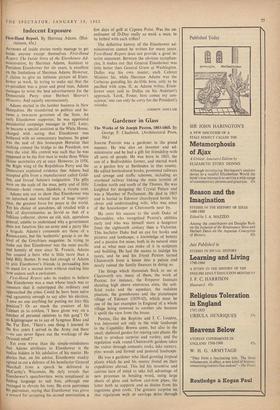Indecent Exposure
AUTHORS of inside stories rarely manage to get inside anyone except themselves. First-Hand Report: The Inside Story of the Eisenhower Ad- ministration, by Sherman Adams, Assistant to President Eisenhower for six years, is excellent on the limitations of Sherman Adams. However, it claims to give an intimate picture of Eisen- hower at work. In trying to make out that the ex-president was a great and good man, Adams manages to write the best advertisement for the Democratic Party since Herbert Hoover's Memoirs. And equally unconsciously.
Adams started in the lumber business in New Hampshire. He transferred to politics and be- came a two-term governor of the State. An early Eisenhower supporter, he was appointed presidential campaign manager in 1952. Later, he became a special assistant at the White House, charged with seeing that Eisenhower was bothered with no unnecessary business. So great was the zeal of this homespun Horatius that nothing crossed the bridge to the President, not even the vital. His control was such that he was supposed to be the first man to make three White House secretaries cry at once. However, in 1958, the Right wing of the Republican Party and the Democrats exploited evidence that Adams had accepted gifts from a manufacturer called Gold- fine, and forced Adams's resignation. The gifts were on the scale of the man, petty and of little account—hotel rooms, blankets, a vicuna coat.
Adams sets out to show that Eisenhower was an informed and relaxed man of huge experi- ence, the greatest force for peace in the world. Yet his choice of anecdotes, all retailed with a lack of discrimination as fervid as that of a folklore collector, shows an old, sick, querulous general, unable to understand why a government does not function like an army and a party like a brigade. Adams's comments are those of a Rosencrantz, but his `authentic' gossip is on the level of the Greyfriars magazine. In trying to make out that Eisenhower was the most pacific and homely of men since St. Francis, Adams has created a hero who is little more than a bald Billy Bunter. It was bad enough of Adams to join Eisenhower's friends in persuading him to stand for a second term without making him now endure such a caricature.
First-Hand Report asks its readers to believe that Eisenhower was a man whose touch was so common that it outstripped the ordinary and approached the crass. Could he have been naïve and egocentric enough to say after his election, owe no one anything for putting me into this Position'? Or so much the creature of his Cabinet as to confess, 'I have given way on a number of personal opinions to this gang'? Or so Kiplingesque as to say of Syngman Rhee and the Far East, `There's one thing I learned in the five years I served in the Army out there —we can never figure out the workings of the Oriental mind'?
Yet even worse than the simple-mindedness that Adams attributes to Eisenhower is the malice hidden in his adulation of his master. He glories that, on his advice, Eisenhower weakly agreed to cut a defence of his benefactor General Marshall from a speech he delivered in McCarthy's Wisconsin. He slyly reveals that Eisenhower's speechwriters were nonplussed in finding language to suit him, although one managed to elevate his tone. He even patronises his patroniser, saying that Eisenhower was given a reward for accepting his second nomination, a
few days of golf at Cypress Point. Was the co- ordinator of D-Day really so weak a man, to be bribed with such trifles?
The definitive history of the Eisenhower ad- ministration cannot be written for many years. First-Hand Report does not provide a good in- terim statement. Between the obvious sycophan- cies, it makes out that General Eisenhower was little better than General Grant at Washington. Dulles was his own master, each Cabinet Minister his, while Sherman Adams was the Ccrberus guarding his do-little boss, only to be pacified with sops. If, as Adams writes, .Eisen- hower once said to Dulles on his Assistant's approach, `Look, Foster, here comes my con- science,' one can only be sorry for the President's mistake.
ANDREW SINCLAIR


































 Previous page
Previous page